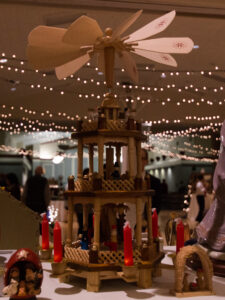
O Christmas Tree, O Christmas Tree,
Your boughs can teach a lesson
That constant faith and hope sublime
Lend strength and comfort through all time.
O Christmas Tree, O Christmas Tree,
Your boughs can teach a lesson.
When I was a child, Christmas meant presents. It also meant going to our small town Christmas market. There, we boarded a tiny train to take us for rides around the church. Santa then showed up and gave us chocolate Santas, deep-fried pastries, and gingerbread – anything sweet a child’s heart could wish for. Of course, there was also a beautiful Christmas tree. However, we had something that made my Christmas experience truly different from that of most children in the United States – a Christmas pyramid.
These Christmas pyramids came – just like my grandfather – from the Ore Mountains, located at the German and Czechoslovakian border. They are made of wood and consist of several tiers adorned with tiny figures. On top of the pyramid, the rotor blades circulate when you light the candles below.
Until the middle of the 19th century, gigantic pyramids were found in churches where they were decorated with branches of fir trees and lots of candles. Before people even had Christmas trees at home in this region, they already had these pyramids. As time went on, however, they were replaced with the Christmas trees we know today.
When you think about Christmas, along with Santa Claus, the Christmas tree is most likely the first thing that comes to mind. When you watch a Christmas movie, there’s the obligatory Christmas tree the family gathers around. When you look for videos on YouTube, you see cats attracted by its shininess and mislead by their will of destruction. And, of course, most of us will know the stunning Christmas tree on Times Square in New York City.
Despite all the Christmas-themed movies made in Hollywood, there haven’t always been Christmas trees in the U.S. It’s one of many stories that speaks of the various connections between the U.S. and Germany, as Christmas trees weren’t really known in the U.S. until German immigrants brought them over at the beginning of the 19th century. Modern-day Christmas trees originated in Germany in the 16th century.
The early German Christmas trees, however, were found in guild-houses so that the children of guild members could take apples, nuts, dates, and pretzels as a reward for their church service on Christmas Day. Decades later, wealthy Protestants, who didn’t want to use the Catholic nativity scenes anymore, started to bring Christmas trees into their homes. And thus began the tradition of putting up Christmas trees. With wealth rising in the Western world, more and more families were able to afford a tree, and many of the other traditions – like the Christmas pyramid – were pushed aside.
Yet, they still exist, and my family and I will put up both: a Christmas tree and my grandfather’s Christmas pyramid. Actually, these have made quite a strong comeback, and if you wish, you can still buy them today.
4,372 Total Views, 5 Views Today






